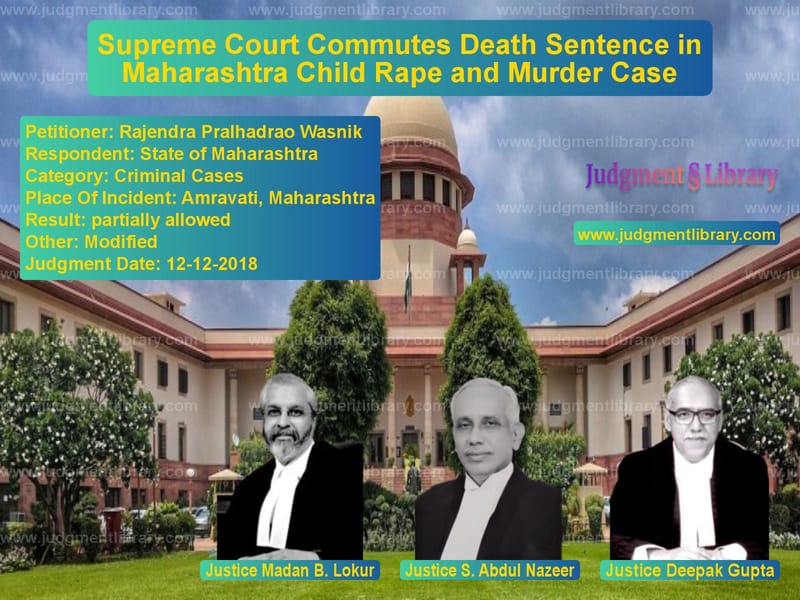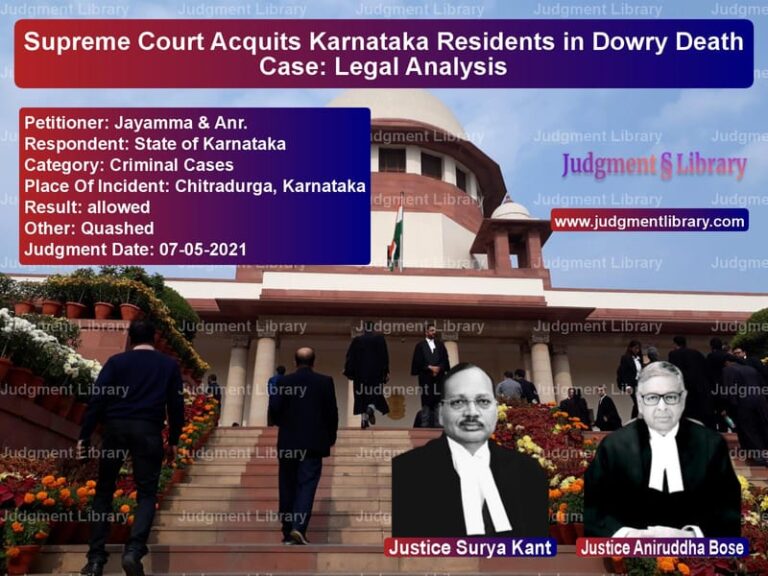Supreme Court Commutes Death Sentence in Maharashtra Child Rape and Murder Case
The case of Rajendra Pralhadrao Wasnik v. State of Maharashtra is a significant ruling on capital punishment, particularly in cases involving circumstantial evidence. The Supreme Court commuted the death sentence of the appellant to life imprisonment, emphasizing the need for courts to assess the possibility of reformation and rehabilitation before awarding the death penalty. This judgment highlights the evolving jurisprudence on capital punishment and the importance of balancing justice with human rights considerations.
Background of the Case
The case involved the rape and murder of a 3-year-old girl in Amravati, Maharashtra, on the night of March 2-3, 2007. The prosecution relied entirely on circumstantial evidence to convict the accused. The Sessions Court found the accused guilty and sentenced him to death on September 10, 2008, citing the ‘rarest of rare’ doctrine. The Bombay High Court upheld this decision on March 26, 2009.
The appellant’s conviction and sentence were subsequently challenged in the Supreme Court, which initially upheld the death penalty in 2012. However, after the Mohd. Arif alias Ashfaq v. Registrar, Supreme Court of India ruling in 2014, which mandated open-court hearings for review petitions in death penalty cases, the appellant sought a reconsideration of his sentence.
Key Issues in the Case
- Whether the death sentence was justified in a case based solely on circumstantial evidence.
- Whether the probability of reformation and rehabilitation was adequately considered.
- Whether the non-presentation of DNA evidence affected the fairness of the trial.
- Whether the trial court erred in considering the pendency of other cases against the appellant while awarding the death sentence.
Arguments by the Petitioner (Appellant)
The appellant, represented by Senior Advocate, contended:
- The case was based entirely on circumstantial evidence, and courts have historically refrained from awarding the death penalty in such cases unless there were exceptional circumstances.
- The probability of reformation and rehabilitation was never considered at any stage of the proceedings, as mandated by Bachan Singh v. State of Punjab.
- The prosecution failed to produce crucial DNA evidence that could have corroborated or disproven the case against him.
- The trial court wrongly considered pending cases against the appellant while determining his sentence, violating his presumption of innocence in those cases.
Arguments by the Respondent (State of Maharashtra)
The State of Maharashtra, represented by the Public Prosecutor, argued:
- The crime was exceptionally brutal, and the circumstances justified the death penalty under the ‘rarest of rare’ doctrine.
- The Sessions Court and the High Court had already balanced the aggravating and mitigating factors before upholding the death penalty.
- The failure to produce DNA evidence did not impact the case significantly, as the prosecution had established guilt beyond reasonable doubt through other evidence.
- The trial court was justified in considering the appellant’s criminal antecedents when deciding on the sentence.
Supreme Court’s Observations
The Supreme Court critically analyzed the case and made the following key observations:
1. Circumstantial Evidence and the Death Penalty
The Court reiterated that capital punishment should be awarded only in the rarest of rare cases, and that in cases based on circumstantial evidence, courts should be especially cautious. It stated:
“Ordinarily, it would not be advisable to award capital punishment in a case of circumstantial evidence. But there is no hard and fast rule that death sentence should not be awarded in a conviction based on circumstantial evidence.”
The Court referred to previous rulings such as Swamy Shraddananda v. State of Karnataka and Santosh Kumar Satishbhushan Bariyar v. State of Maharashtra, which emphasized that in cases based on circumstantial evidence, death penalty should be avoided unless the case is exceptional.
2. Consideration of Reformation and Rehabilitation
The Court emphasized that the probability of reformation and rehabilitation is a crucial factor in sentencing and that the burden is on the State to prove that a convict is beyond reformation. It stated:
“Consideration of the reformation, rehabilitation, and re-integration of the convict into society cannot be over-emphasized. It is for the prosecution to prove to the court, through evidence, that the convict cannot be reformed or rehabilitated.”
Since no such evidence was presented by the State, the Court found the death sentence inappropriate.
3. Failure to Produce DNA Evidence
The Court expressed concern over the prosecution’s failure to present DNA evidence, stating:
“For the prosecution to decline to produce DNA evidence would be a little unfortunate, particularly when the facility of DNA profiling is available in the country.”
The Court ruled that the failure to produce DNA evidence must result in an adverse inference against the prosecution.
4. Considering Pending Cases in Sentencing
The Court held that considering pending cases while deciding the sentence violates the fundamental principle of presumption of innocence. It stated:
“The mere pendency of one or more criminal cases against a convict cannot be a factor for consideration while awarding a sentence. Not only is it statutorily impermissible, but it also violates the fundamental presumption of innocence.”
The Court ruled that the trial court had erred in taking pending cases into account.
Supreme Court’s Judgment
The Supreme Court ruled:
- The death sentence awarded to the appellant was commuted to life imprisonment.
- The appellant would remain in custody for the rest of his natural life without parole.
- The failure to produce DNA evidence and the lack of consideration for reformation and rehabilitation weighed against awarding the death penalty.
- The trial court had erred in considering pending cases against the appellant while deciding the sentence.
Impact of the Judgment
This ruling has significant implications:
- Strengthens the Principle of Fair Sentencing: The decision reinforces that sentencing must be based on proper legal principles, not assumptions or prejudices.
- Emphasizes the Importance of DNA Evidence: The ruling highlights the necessity of using scientific evidence in criminal trials.
- Limits the Use of Pending Cases in Sentencing: The judgment clarifies that courts cannot use unproven allegations to justify harsher sentences.
- Advances the Reformative Justice Approach: The Court reaffirmed that even those convicted of heinous crimes deserve a chance at reformation.
Conclusion
The Supreme Court’s judgment in Rajendra Pralhadrao Wasnik v. State of Maharashtra is a landmark decision in capital punishment jurisprudence. By commuting the death sentence to life imprisonment, the Court reinforced the principle that punishment should be just, proportional, and based on sound legal reasoning. The ruling underscores the need for careful evaluation of circumstantial evidence, the consideration of reformation, and the use of scientific methods like DNA profiling in criminal cases.
Petitioner Name: Rajendra Pralhadrao Wasnik.Respondent Name: State of Maharashtra.Judgment By: Justice Madan B. Lokur, Justice S. Abdul Nazeer, Justice Deepak Gupta.Place Of Incident: Amravati, Maharashtra.Judgment Date: 12-12-2018.
Don’t miss out on the full details! Download the complete judgment in PDF format below and gain valuable insights instantly!
Download Judgment: Rajendra Pralhadrao vs State of Maharashtra Supreme Court of India Judgment Dated 12-12-2018.pdf
Direct Downlaod Judgment: Direct downlaod this Judgment
See all petitions in Murder Cases
See all petitions in Custodial Deaths and Police Misconduct
See all petitions in Juvenile Justice
See all petitions in Judgment by Madan B. Lokur
See all petitions in Judgment by S. Abdul Nazeer
See all petitions in Judgment by Deepak Gupta
See all petitions in partially allowed
See all petitions in Modified
See all petitions in supreme court of India judgments December 2018
See all petitions in 2018 judgments
See all posts in Criminal Cases Category
See all allowed petitions in Criminal Cases Category
See all Dismissed petitions in Criminal Cases Category
See all partially allowed petitions in Criminal Cases Category







